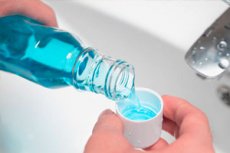New publications
Alcohol mouthwash can disrupt the oral microbiome, causing gum disease and cancer
Last reviewed: 02.07.2025

All iLive content is medically reviewed or fact checked to ensure as much factual accuracy as possible.
We have strict sourcing guidelines and only link to reputable media sites, academic research institutions and, whenever possible, medically peer reviewed studies. Note that the numbers in parentheses ([1], [2], etc.) are clickable links to these studies.
If you feel that any of our content is inaccurate, out-of-date, or otherwise questionable, please select it and press Ctrl + Enter.

Using alcohol-based mouthwashes may increase your risk of developing conditions such as gum disease and certain cancers, including colorectal cancer.
These are the results of a study conducted at the Institute of Tropical Medicine in Antwerp, Belgium, led by PhD student Jolein Lauman from the Department of Clinical Sciences.
The study was published in the Journal of Medical Microbiology.
In the study, scientists found significant changes in the composition and quantity of bacteria in the oral microbiome of participants after using the alcohol-based Listerine Cool Mint mouthwash.
Two types of bacteria, Fusobacterium nucleatum and Streptococcus anginosus, were found to increase significantly after daily use of the mouthwash. These bacteria have been linked to several diseases, including gum disease, esophageal cancer, and colorectal cancer.
Scientists also noted a decrease in the number of bacteria of the genus Actinobacteria.
The researchers did not collect information on the participants' eating habits or smoking status. They also did not recommend that the public stop using alcohol-based mouthwashes entirely.
Participants used Listerine mouthwash for three months and then an alcohol-free mouthwash for three months, or vice versa.
The aim of the study was to find ways to reduce the incidence of gonorrhea, chlamydia and syphilis in men who have sex with men.
Alcohol Based Mouthwash vs. Alcohol Free Mouthwash
According to Alliance Dental, most mouthwashes sold in drugstores contain alcohol. These mouthwashes can cause a short-term burning sensation in the mouth, an unpleasant taste, and dry mouth.
Alcohol also destroys almost all bacteria in the mouth - both good and bad.
Alcohol-free mouthwash does not kill all bacteria, but it does create a new balance of bacteria in your mouth.
The researchers said people with dry mouth issues, such as patients undergoing radiation treatment, taking certain medications, or having medical conditions such as diabetes or Sjogren's syndrome, may prefer an alcohol-free rinse. People with a history of alcohol dependence and those with extensive dental restorations may also prefer an alcohol-free rinse.
"Alcohol-based mouthwashes are widely available," Lauman said in a press release. "The public can use them daily to combat bad breath or prevent periodontal disease, but should be aware of the potential consequences. Ideally, long-term use should be done under the guidance of a health care professional."
Should you use an alcohol-based mouthwash?
Researchers reported that use of the alcohol-based mouthwash Listerine was associated with increased levels of opportunistic bacteria that may increase the risk of periodontal disease, esophageal and colorectal cancer, and systemic diseases.
"We found that Listerine Cool Mint had a negative impact on some beneficial bacteria," said Chris Kenyon, PhD, a professor at the Institute of Tropical Medicine and one of the study's authors. "For example, it reduced the number of bacteria in the phylum Actinobacteria. Various Actinomyces species are part of the oral nitrate-reducing bacteria, which convert salivary nitrate to nitrite to form the powerful vasodilator nitric oxide, which is important for maintaining normal blood pressure. The nitrate-nitrite-nitric oxide pathway is an important mechanism linking the oral microbiome to cardiovascular health."
The authors note that regular use of Listerine should be undertaken with caution and careful consideration.
"It [alcohol-based mouthwash] may be safe for use in short periods, but based on our findings and other data, I would not recommend long-term use," Kenyon told Medical News Today.
However, at least one expert says it's important to remember that mouthwash does not directly cause cancer.
"Alcohol mouthwash may be a contributing factor if a person also smokes, drinks alcohol or eats an unhealthy diet, but studies do not suggest it is the sole cause of cancer. It also requires long-term use," said Dr. Eric Asher, a primary care physician at Northwell Lenox Hill Hospital in New York City.
"The type of mouthwash that should be used is determined by specific dental needs, which can be discussed at a bi-annual dental examination. This is determined based on the condition of the enamel (the layer that protects the teeth) and the overall health of the teeth," added Asher, who was not involved in the study.
"The researchers stress that the study's findings do not mean the public should stop using mouthwash altogether," he added.
Limitations of the Mouthwash and Cancer Study
The study had several limitations.
Oral sampling was limited to the palatine arches and posterior oropharynx. The authors note that the results may not be representative of the entire oral cavity. Compliance with mouthwash use was not controlled. Changes were not confirmed by a second method. The study included only men who have sex with men. Therefore, the results may not be generalizable to the entire population.
